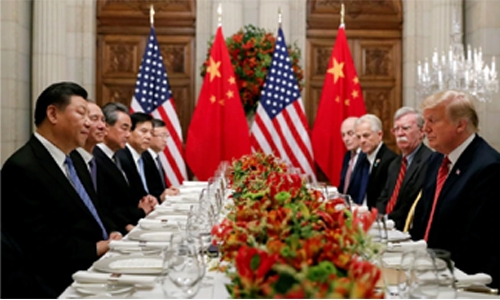US, China ceasefire
ating trade war between the world’s two largest economies, even if huge existing duties will remain in place. Following more than two hours of dinner talks between the two leaders, the White House said an increase of tariffs from 10 to 25 percent due to kick in on January 1 would now be put on hold, providing room for intense negotiations.
The agreement, hashed out over steak in the Argentine capital Buenos Aires, lowers the temperature in a conflict that has spooked world markets. The two leaders, who were in Buenos Aires for a summit of the G20 countries, called it “a highly successful meeting,” a White House statement said.
“The principal agreement has effectively prevented further expansion of economic friction between the two countries and has opened up new space for win-win cooperation,” said Chinese Foreign Minister Wang Yi. “It’s an incredible deal,” Trump told reporters aboard Air Force One on the flight home to Washington, adding it would have an “incredibly positive impact” on American farmers.
Partial truce
Under the agreement, Trump is shelving a plan to raise existing tariffs of 10 per cent to 25pc from the start of next year.Xi avoids further immediate pressure on China’s slowing economy, while Trump -- scarred by last month’s midterm elections that saw the Democrats regain control of the House of Representatives -- can ease damage to agricultural US states that export to China, particularly soybean producers.
“China will be buying massive amounts of product from us,” Trump said after the talks. For Beijing-based political consultant Hua Po, “this was a rare opportunity for China” to capitalize on what they saw as Trump’s compromised position after the midterms. “At this time, it was acceptable for China to maintain some bottom lines while making some major concessions.”
But Brad Setser, a former Treasury official and now senior fellow at the Council on Foreign Relations in Washington, told Bloomberg that much remains to be done. “The hard part is finding the basis for a real deal that settles the broader issues rather than agreeing on a pause,” Setser said.
Related Posts

